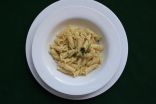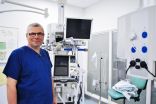(Press-News.org) Many patients in the latter stage of Parkinson's disease are at high risk of dangerous, sometimes fatal, falls. One major reason is the disabling symptom referred to as Freezing of Gait (FoG) -- brief episodes of an inability to step forward that typically occurs during gait initiation or when turning while walking. Patients who experience FoG often lose their independence, which has a direct effect on their already degenerating quality of life. In the absence of effective pharmacological therapies for FoG, technology-based solutions to alleviate the symptom and prolong the patients' ability to live independently are desperately being sought.
CuPID is a project three years in the making and the product of an eight-member European Union-funded consortium including researchers at Tel Aviv University. It strives to provide personalized rehabilitation for patients with Parkinson's disease who experience FoG or other gait disturbances. CuPID is a home-based, personalized rehabilitation tool in the form of a smartphone app that harnesses wearable sensors, audio biofeedback, and external cueing to provide intense motivational training tailored to each patient. The results are monitored remotely by medical professionals, who provide quality care while enhancing patient compliance.
The CuPID app just completed its pilot run and is being fine-tuned for more widespread use. It utilizes small sensors placed on a patients' shoes that measure a person's gait in "real-time." If certain deviations from a pre-set norm emerge, an audio message alerts the patient to change his or her walking pattern immediately to avoid a dangerous situation.
"FoG is a leading cause of disability in patients with Parkinson's disease," said professor Jeffrey Hausdorff of TAU's Sackler Faculty of Medicine and the Center for Movement, Cognition, and Mobility at Tel Aviv Sourasky Medical Center (TASMC). Hausdorff is the lead investigator on the Israeli team. "It often occurs during 'walking transitions' associated with turning, starting, stopping, and moving in open spaces. It can also occur when people approach narrow spaces, such as doors or elevators, and in crowded places. Recognizing such situations is a very powerful key for prevention -- and this is one of the features of this program."
Hausdorff and his team at Tel Aviv Medical Center conducted a pilot study on 40 subjects: 20 patients with Parkinson's disease who used the CuPid app and 20 patients who carried out conventional exercises and did not use the app. The results are promising and the investigators are currently exploring the possibility of a larger follow-up study to further demonstrate the app's efficacy.
Repairing a "short circuit"
Dr. Anat Mirelman, also of TAU and TASMC, co-directed the project. She explained that FoG episodes resemble a short circuit in the brain, rendering it unable to generate the appropriate stepping pattern, often leaving the patient in an untenable and frustrating situation. The app is designed to circumvent that difficulty.
"There are two modes to the app," said Mirelman. "The first improves the overall gait pattern -- 'keep it up, you are walking well,' says a virtual physical therapist -- and the positive feedback while walking actually helps the patient emotionally as well as functionally. If the gait pattern needs adjustments, the app will let the user know. The second mode helps patients avoid and free themselves of FoG if they are already stuck. We believe, and we have already seen in clinical trials here at the hospital, that this has the potential to improve the quality of life for these patients quite dramatically.
"FoG reduces patients' independence. Patients become afraid of walking by themselves and this leads to self-imposed restrictions in mobility," Mirelman continued. "When their feet get stuck to the ground, their bodies lunge forward -- it's very frightening. People often end up in wheelchairs, and this is a vicious cycle, as it places more reliance on the assisted-living infrastructure."
"The program now integrates the expertise of a patient's physical therapist, who establishes what is considered a patient's 'normal' or 'strong' walking pattern," said Hausdorff. "It's unobtrusive and has the potential to reduce dependence on Parkinson's medication that has detrimental side effects. How much or how often the app is used depends on how advanced the disease is, but since the system is so small and non-invasive, it can be used just about anywhere. It's exciting to think of the potential of long-term use."
INFORMATION:
American Friends of Tel Aviv University (http://www.aftau.org) supports Israel's most influential, most comprehensive, and most sought-after center of higher learning, Tel Aviv University (TAU). US News & World Report's Best Global Universities Rankings rate TAU as #148 in the world, and the Times Higher Education World University Rankings rank TAU Israel's top university. It is one of a handful of elite international universities rated as the best producers of successful startups, and TAU alumni rank #9 in the world for the amount of venture capital they attract.
A leader in the pan-disciplinary approach to education, TAU is internationally recognized for the scope and groundbreaking nature of its research and scholarship -- attracting world-class faculty and consistently producing cutting-edge work with profound implications for the future.
While the use of antiangiogenesis drugs that block the growth of new blood vessels can improve the treatment of some cancers, clinical trials of their ability to prevent the development of new metastases have failed. Now a study from the Massachusetts General Hospital (MGH) Cancer Center may have found at least one reason why. In their paper published online in the Journal of the National Cancer Institute, an MGH research team reports finding that the growth of metastases in lymph nodes -- the most common site of cancer spread -- does not require new blood vessels but instead ...
A good or mediocre appetizer has the potential to significantly change how the main course is enjoyed, according to one Drexel food science professor.
Jacob Lahne, PhD, an assistant professor in the Center for Hospitality and Sport Management, recently found that a comparatively good appetizer could make people enjoy the main course less than if it were preceded by a mediocre appetizer.
Lahne tested and analyzed subjects' hedonic (liking) responses to a main dish of "pasta aglio e olio" (pasta with garlic and oil) after they had either a good or mediocre bruschetta ...
Nature loves crystals. Salt, snowflakes and quartz are three examples of crystals - materials characterized by the lattice-like arrangement of their atoms and molecules.
Industry loves crystals, too. Electronics are based on a special family of crystals known as semiconductors, most famously silicon.
To make semiconductors useful, engineers must tweak their crystalline lattice in subtle ways to start and stop the flow of electrons.
Semiconductor engineers must know precisely how much energy it takes to move electrons in a crystal lattice. This energy measure is the ...
Scientists from UCL (University College London) have designed a chemical compound that has reduced the growth of pancreatic cancer tumours by 80 percent in treated mice.
The compound, called MM41, was designed to block faulty genes. It appears to do this by targeting little knots in their DNA, called quadruplexes, which are very different from normal DNA and which are especially found in faulty genes.
The findings, published in Nature Scientific Reports, showed that MM41 had a strong inhibiting effect on two genes -- k-RAS and BCL-2 -- both of which are found in the ...
Wading bird numbers in the Florida Everglades are driven by water patterns that play out over multiple years according to a new study by the U.S. Geological Survey and Florida Atlantic University. Previously, existing water conditions were seen as the primary driving factor affecting numbers of birds, but this research shows that the preceding years' water conditions and availability are equally important.
"We've known for some time that changes in water levels trigger a significant response by wading birds in the Everglades," said James Beerens, the study's lead author ...
Researchers from The University of Manchester are part of a team that has identified an important new approach to diagnose infections in critically ill patients rapidly and accurately.
A study by colleagues in Salford and Manchester found that chemically analysing breath specimens from patients in intensive care can reveal bacterial infection in the lower respiratory tract of ventilated patients at risk of developing pneumonia.
Although the work is in its early stages, the findings so far look very exciting and could potentially have a huge effect on clinical practice ...
A pioneering new technique to produce high-quality, low cost graphene could pave the way for the development of the first truly flexible 'electronic skin', that could be used in robots.
Researchers from the University of Exeter have discovered an innovative new method to produce the wonder material Graphene significantly cheaper, and easier, than previously possible.
The research team, led by Professor Monica Craciun, have used this new technique to create the first transparent and flexible touch-sensor that could enable the development of artificial skin for use in ...
Researchers at Ludwig-Maximilians-Universitaet (LMU) in Munich have used DNA barcoding to elucidate the diversity of the sponge fauna found in Antarctic waters. The data provide new insights into the evolution of this poorly characterized group.
Sponges constitute an important component of marine ecosystems in the waters around Antarctica. As filter feeders that rely on food particles suspended in the water passing through complex networks of canals lined with flagellated cells, they provide protected niches for many other organisms. "In spite of their considerable ecological ...
How a chimpanzee views a video of an infant chimp from another group being killed gives a sense of how human morality and social norms might have evolved. So says Claudia Rudolf von Rohr of the University of Zurich in Switzerland, lead author of a paper in Springer's journal Human Nature. It provides the first evidence that chimpanzees, like humans, are sensitive to the appropriateness of behaviors, especially those directed toward infants. It also shows that these primates might only take action when a member of their own group is being harmed.
The researchers filmed ...
Working with heart muscle cells from diabetic rats, scientists at Johns Hopkins have located what they say is the epicenter of mischief wreaked by too much blood sugar and used a sugar-gobbling enzyme to restore normal function in the glucose-damaged cells of animal heart muscles.
In addition to much-needed insight into the process of diabetes-related heart damage, the study, described June 24 in the journal Diabetes, offers a clue to a possible treatment strategy for diabetic cardiomyopathy, a condition marked by progressive weakening of the heart muscle found in 60 ...

